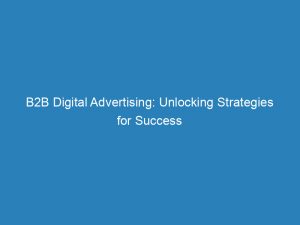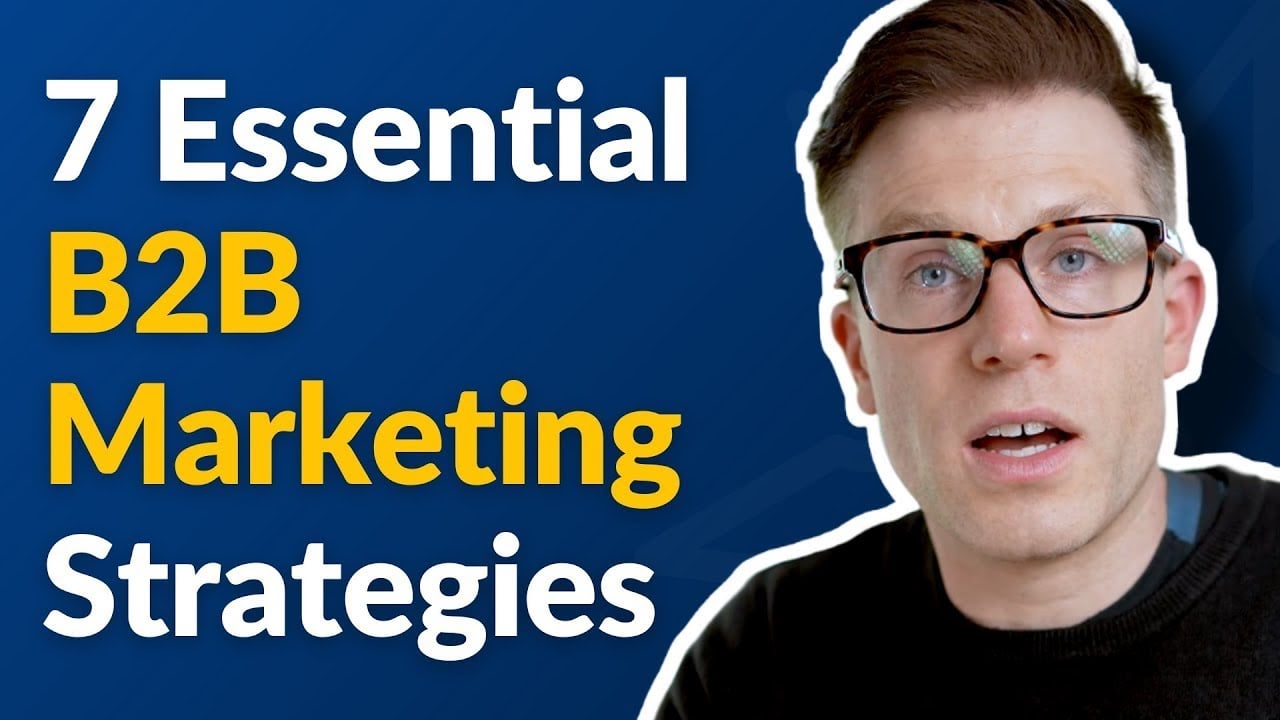In today’s competitive business landscape, reaching decision-makers at companies has become more challenging than ever. Traditional marketingstrategies no longer cut it, and B2B companies are turning to the digital realm to capture the attention of their targeted audience.
Enter B2Bdigital advertising, a powerful tool that aims to connect businesses with the right decision-makers through email marketing, content marketing, and social media advertising. This captivating approach focuses on utilizing long-tail keywords, personalization, and precise ROI measurement to ensure maximum impact.
By harnessing the potential of platforms like LinkedIn and Twitter, B2Bdigital advertising has revolutionized the way businesses connect, engage, and succeed in the digital realm.
| Item | Details |
|---|---|
| Topic | B2B Digital Advertising: Unlocking Strategies for Success |
| Category | Ads |
| Key takeaway | In today's competitive business landscape, reaching decision-makers at companies has become more challenging than ever. |
| Last updated | December 28, 2025 |
advertising">b2b digital advertising
B2B digital advertising refers to the use of digital channels, such as websites, email, and social media, to market products and services to other businesses. This type of marketing primarily focuses on targeting decision-makers at companies and recognizes that B2B sales cycles are typically longer compared to B2C.
Strategies in B2B digital advertising include email marketing, content marketing, and social media marketing. Platforms like LinkedIn and Twitter are particularly effective for B2B marketing, with LinkedIn being the most impactful social media platform for B2B companies.
B2B SEO is crucial as decision-makers often use the internet to research products. Personalization and targeting are also key in B2B digital advertising, as is the creation of valuable content.
B2B marketers aim to measure ROI and increase revenue, and they should leverage employee voices and influencers. With B2B digital advertising spending reaching $6.08 billion in the US in 2020, trends such as video marketing, influencer marketing, and data collection are gaining importance.
Ultimately, a strong and informative website, along with the use of PPC advertising, can help B2B marketers reach new audiences.Key Points:
- B2B digital advertising uses digital channels to market products/services to other businesses
- Strategies include email marketing, content marketing, and social media marketing
- LinkedIn and Twitter are effective platforms for B2B marketing
- B2B SEO and targeted content are crucial for reaching decision-makers
- Measuring ROI and increasing revenue are key goals for B2B marketers
- Trends in B2B digital advertising include video marketing, influencer marketing, and data collection
Sources
https://blog.hubspot.com/marketing/b2b-marketing
https://www.reliablesoft.net/b2b-digital-marketing/
https://www.salesforce.com/resources/articles/b2b-marketing-guide-to-driving-business-growth/
https://careerfoundry.com/en/blog/digital-marketing/digital-marketing-in-b2b/
Check this out:
? Pro Tips:
1. Use Account-Based Marketing (ABM) strategies to target specific companies and decision-makers within those companies. This personalized approach can yield higher conversion rates.
2. Utilize remarketing tactics to stay top-of-mind with potential B2B clients. Set up remarketing ads that follow them across various platforms, reminding them of your offerings.
3. Consider leveraging LinkedIn Groups as a way to target niche B2B communities. Join relevant groups and actively participate in discussions to build relationships and establish credibility.
4. Invest in thought leadership content to showcase your expertise and provide value to your B2B audience. This can be in the form of whitepapers, case studies, or webinars.
5. Collaborate with complementary B2B brands to create joint marketing campaigns. This can help expand your reach and tap into new B2B networks.
B2B Digital Marketing Channels
In the ever-evolving world of marketing, B2B digital marketing has emerged as a powerful strategy for businesses to engage and connect with other companies. This form of marketing harnesses the potential of digital mediums such as websites, email, and social media to promote products and services to B2B clients.
With the internet becoming a central hub for research and decision-making, B2B digital marketing has taken center stage in driving business growth.
One of the primary advantages of B2B digital marketing is the wide variety of channels it encompasses. Websites serve as the foundation for a company’s online presence, providing a platform to showcase products, share valuable content, and facilitate communication.
Email marketing enables businesses to establish direct connections with decision-makers and nurture leads. Social media, on the other hand, offers opportunities to raise brand awareness, engage with potential customers, and build a community around a company’s offerings.
Targeting Decision-Makers In B2B Marketing
Unlike B2C marketing, which focuses on appealing to consumers, B2B marketing aims to capture the attention of decision-makers within organizations. These individuals, often executives or key stakeholders, hold the power to make purchasing decisions on behalf of their companies.
Therefore, B2B marketing strategies need to be tailored to resonate with this specific audience.
By understanding the needs and pain points of decision-makers, B2B marketers can develop targeted campaigns that address these concerns and showcase the value their products or services can provide. This may involve creating personalized content, leveraging industry-specific language, or highlighting case studies and testimonials from satisfied clients.
Building trust and establishing credibility among decision-makers is vital for successful B2B marketing.
Longer Sales Cycles In B2B Marketing
One defining characteristic of B2B marketing is the longer sales cycle compared to B2C. B2B transactions typically involve larger investments and higher stakes, requiring careful consideration and evaluation from decision-makers.
As a result, B2B marketers must adopt a patient and strategic approach when nurturing leads and guiding prospects through the sales funnel.
In B2B marketing, it is crucial to understand that the decision-making process is often complex and involves multiple stakeholders. A successful B2B marketer must navigate through this intricate web of decision-makers, influencers, and gatekeepers.
Building relationships, providing relevant information, and offering comprehensive support are essential for securing deals in this competitive landscape.
Importance Of Long-Tail Keywords In B2B Marketing
When it comes to B2B marketing, keywords play a significant role in driving organic traffic and reaching the right audience. However, unlike their B2C counterparts, B2B marketers often focus on long-tail keywords with lower search volumes.
Updated for the new year’s advertising best practices.
Rather than targeting broad and highly competitive terms, B2B marketers choose niche keywords that align with the specific needs and interests of their target audience.
By honing in on long-tail keywords, B2B marketers can attract highly qualified leads who are actively searching for solutions. These keywords often exhibit higher conversion rates as they indicate intent and a deeper level of interest.
Crafting relevant and informative content around these long-tail keywords helps B2B brands establish themselves as thought leaders and industry experts in the eyes of decision-makers.
Effective Platforms For B2B Marketing: LinkedIn And Twitter
In the ever-expanding landscape of social media platforms, LinkedIn and Twitter have emerged as particularly impactful platforms for B2B marketing. LinkedIn, with its professional focus and extensive networking capabilities, provides an ideal space for connecting with decision-makers, sharing industry insights, and building relationships.
B2B marketers can leverage LinkedIn’s robust targeting options to reach specific industries, job titles, and company sizes.
Twitter, on the other hand, offers a platform for real-time conversations and engagement. By utilizing Twitter, B2B marketers can connect with business professionals, join industry discussions, and share valuable content.
The platform’s hashtag feature enables B2B marketers to tap into trending topics and participate in relevant conversations.
Key Takeaway: B2B marketers can unlock immense potential by leveraging the power of LinkedIn and Twitter as effective platforms for connecting with decision-makers and building brand presence.
Stay tuned for Part 2 of this blog series, where we will explore the crucial role of B2B SEO in driving online visibility and attracting decision-makers.
Buy Traffic • Native Ad Network • Programmatic Advertising • Self-Serve DSP Platform











